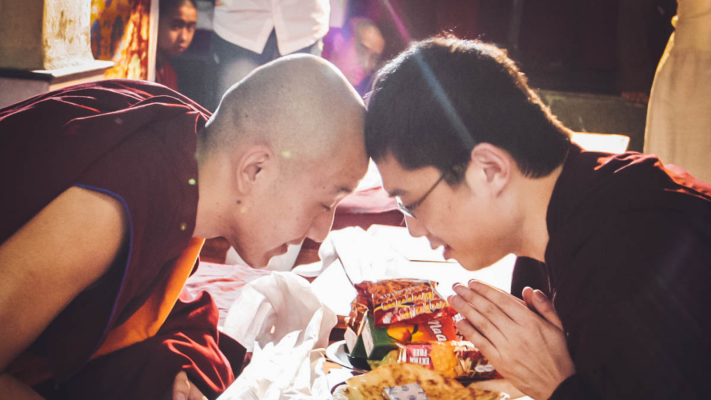Guru devotion is the heart of spiritual practice in Tibetan Buddhism. Without it, we would make very little progress in our spiritual practice. Having devotion for the guru is not about being controlled by the guru or following the guru with blind faith. In fact, we should carry out our ‘due diligence’ to check out the guru before embarking on a guru-disciple relationship. Only when we have developed confidence that the guru can help in our spiritual growth do we whole-heartedly surrender and follow the guru’s advice in our pursuit of enlightenment.
For example, if you want to be a professional golf player, you would check out different coaches to find out which ones have produced the best results and displayed the strongest set of skills. You would decide who suits you and ask if they are willing to take you on as a student. Then you would engage in training sessions, trusting that your chosen coach will bring out and develop your greatest abilities. It’s the same thing with a guru-disciple relationship.
Below is advice from Tsem Rinpoche on the importance of keeping good samaya with the guru.
Teacher samaya is very special to me. The importance of good relations and good samaya with the guru can never be overstressed on the spiritual path. If we don’t keep good relations with our guru, then our mind will degenerate. How does it degenerate? We will find samsaric activities more and more ‘pleasurable.’ We will find our daily routine activities ‘safe.’ We are able to find more and more excuses to justify and convince others that we are fine, that we will do Dharma later or that we are doing the ‘best’ we can now. In fact, people can see through our excuses. But they are too polite to say more.
In actuality, we are drifting further and further away from our practice, Dharma thoughts, Dharma activities and especially Dharma growth within our mindstream. Sometimes we are able to see the degeneration happen, but due to broken unrepaired samaya, we do nothing about it even though we see it. Conviction in Dharma that was very strong before becomes intellectual knowledge used to ‘debate’ with others to protect our degenerated position.
When our samaya further degenerates then we start developing wrong view of our teacher even though our teacher may have been very helpful and beneficial in our lives in the past. In some cases, the teacher has saved our livelihood, lives and even sanity. Yet, we start to have a mental and physical distance. Why? Outwardly it is to show that ‘we are not happy’ with our teacher, but inwardly we know that we have degenerated and we are angry and ashamed to face our teacher and other students. It is hard to face the cold hard facts that we know to be true. Blaming other students for our distance is another cover-up for laziness, jealousy and anger. Why? What Bodhisattva-aspirant hates their perceived enemies? Or blames their enemies?
Seeing our teacher point blank reminds us of our degeneration. The other students working hard, doing well in their Dharma pursuits and activities reminds us of what we’re supposed to do but are not doing. Therefore we avoid, or go deeper into our so-called ‘beneficial’ activities in our mundane lives.
In extreme cases, boiling jealousy may even arise when we hear that other students are successful in their Dharma work and pursuits. Why does jealousy arise? Because we have used Dharma to feed our ego and to look good. Looking good is to fill an empty void that we feel inside. That empty void exists because there is a gnawing feeling that we have not done something really worthwhile with our lives. This will eat at us. Sometimes in our degenerated state, we wish to teach our teacher a ‘lesson’ or ‘punish’ our teacher for not giving us what we wanted; so we stay away or do not cooperate. But the whole point of a teacher is not to give us what we want but what we actually need. After all, that is why we call it a teacher-disciple relationship.
When we degenerate in our relationship with our teacher, degeneration in our Dharma practice will definitely follow. It is unfortunately a natural process. Then we are left with just the mundane activities of daily life that we try to seek ‘refuge’ and comfort in. Engaging in familiar mundane activities may temporarily soothe our mind for the time being, but it deceptively takes a toll on our time that is fast running out. No one lives forever. Not the teacher and not the students. We end up hiding behind our daily mundane activities and cover up by telling people that we are very busy. But in fact we are no busier than other Dharma students who are doing the same mundane activities we are doing daily combined with their Dharma work and practice simultaneously.
Please remember that the degeneration in our relationship with our teacher is impermanent just like all phenomena, so we should not hold on to it as if it is hard and unchanging. It can be changed. Why is realising that all situations are impermanent so important? Because by logic it gives us hope and light. It also combats our laziness which is the root cause of our problems. Knowing things can be changed but doing nothing to change it, is just pure laziness. So our laziness has been hidden behind layers of nice-sounding reasons that hold no basis. It is time to do something.
- Everything can be repaired by Tsem Rinpoche



